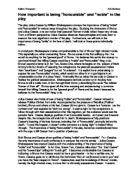Julius Caesar also holds virtues of being “noble” and “honourable”. Caesar refused to release Publius Cimber from exile. Accompanied by the pressure of Metellus (Publius’ brother), Brutus and others at his feet, Caesar did not give in. Caesar is a “constant as the northern star” and explains he “doth not wrong”. It seems right for the conspirators to follow through with their assassination after this negation, yet the audience would see the paradox here. Caesar displays qualities of an honourable leader, an honest one however despite this, the conspirators still stab him to death. Shakespeare artfully positions Caesar’s boasting of his best features, including that of “honourable”, promptly before his death. To see this happen, it doesn’t strike someone as being ‘right’ to indeed follow through. The importance of being “honourable” in the play, becomes overshadowed here with the urge to kill Caesar from a position of jealousy.
Both Brutus and Caesar show qualities of being “noble” and “honourable”. For Cassius, the only importance of such attributes is to conquer the man he envies - Julius Caesar. Shakespeare has created Cassius with the understanding of the importance of being “noble” and “honourable”. In Act One, Scene Two, Cassius talks about “the tired Caesar” and his “coward lips” calling him “a sick girl”. It becomes unmistakable that Cassius is indicating to Brutus that Caesar would not be a good leader - in fact a terrible one, for Rome. Cassius goes on to tell Brutus that he knows “that virtue [honour] to be in you” and you have the “best respect in Rome”. Cassius has used his knowledge of Brutus’ morals, namely the high minded ones, to move him to ultimately assassinate Caesar. It seems Shakespeare has found it quite necessary for the audience to see the importance of being “noble” and “honourable” in the play from a different aspect.
So far we have seen the prominence of being “noble” and “honourable” for Brutus, Caesar and Cassius. In Act Five, Scene Three, we also see a form of it when Brutus and his army are looking at the great possibility of death. Brutus admits he owes more “tears To this man [Cassius]”, which is surprising to hear coming from a stoic. As much as he attempts to repress emotion; from the above quote the audience can transparently see a sense of feeling through his stoicism, a sense of a noble man. This speech would undoubtedly move the Elizabethan audience. We can imagine Brutus holding back the tears, possibly solely because he is off to “a second fight”. They, of course are fighting for Rome at this point, so we see nobility in Brutus for both his country and his lost close friend Cassius.
To summarise, Shakespeare has indubitably and most certainly conveyed the immensely importance of being “noble” and “honourable” in the play. Not to mention the ‘true Roman’s’ morals of being so. For Brutus individually, there is no room for anything but being “noble” and “honourable”. For Mark Antony to say he is the “most noblest Roman of them all”, as a person who has the right to despise him, HAS to prove that statement is true. The Great Julius Caesar paradoxically was murdered directly after evidence of his nobility and it would seem this is a poignant message from Shakespeare, also giving substance to Caesar’s relationship with “noble” and “honourable” traits. Even for someone who finds such morals essential in Brutus, Cassius would have not been able to have Caesar assassinated. So for Cassius, they are also important. In the last Act, the audience once again witnesses the importance of being “noble” and “honourable” in a different light. Brutus’ speech from Line 98 - 110 is verification of these virtues. From a man who has always been known as a stoic, to in front of his army before a fight, show some emotion, again re-enforces the idea that every Roman, be it fictional or not, seeks to live up to being “noble” and “honourable”. Shakespeare has skilfully portrayed this in his characters as it would have been all those hundreds of years ago.







